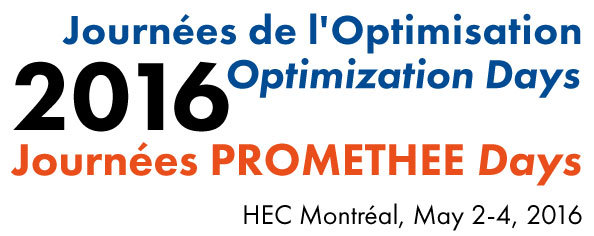
2016 Optimization Days
HEC Montréal, Québec, Canada, 2 — 4 May 2016

MB9 Sustainable OR
May 2, 2016 03:30 PM – 05:10 PM
Location: Pricewaterhouse Coopers
Chaired by Olivier Bahn
4 Presentations
-
 03:30 PM - 03:55 PM
03:30 PM - 03:55 PMA mathematical model for designing self-sufficient vegetable gardens
Plant selection and arrangement in a vegetable garden is key to the nutritional contribution of a harvest, which can be useful during times of uncertainty. This study proposes a linear mathematical model to determine the type and quantity of plants in a pre-determined area so the expected harvest satisfies the nutritional requirements of the household.
-
 03:55 PM - 04:20 PM
03:55 PM - 04:20 PMEmissions and deforestation policies under endogenous environmental absorption efficiency
An important, yet still unexamined issue is how the combined influence of deforestation and pollution accumulation both on the magnitude of carbon sources and the efficiency of pollution sinks affect the evolution of the biosphere. This paper seeks to bridge the gap by introducing a dynamic model of pollution accumulation where, along with a production activity, deforestation generates polluting emissions, while lowering the efficiency of pollution sinks. We also assume that the social planner can invest efforts to restore the efficiency of pollution sinks. To account for the potential impact of scale effects, the impact of restoration efforts depends on the level of the efficiency of pollution sinks. We show that the interactions between polluting emissions and deforestation can result in different outcomes depending on the existence and nature of scale effects on restoration efforts.
-
 04:20 PM - 04:45 PM
04:20 PM - 04:45 PMA generic framework for analyzing the sustainable integration of new products: An application to the forest value chain
In the context of a regional economy, the allocation of natural resources and its products, in-between stakeholders, might generate better overall profit using value chain optimization. The key challenge is how to configure both new and existing technologies within the forest land base to produce sustainable value. The paper proposes a generic mathematical framework to model a regional value chain network where the impact of integrating new technologies can be evaluated through a sustainable manner.
-
 04:45 PM - 05:10 PM
04:45 PM - 05:10 PMDeep GHG emission reductions in Canada: Insights from a bottom-up approach
This presentation analyzes possible decarbonization pathways for the Canadian energy sector to satisfy a goal of 60% reduction of 1990 energy-related emissions in 2050. The most efficient mitigation measures and the optimal timing of their implementation are determined using the NATEM model, a highly detailed bottom-up optimization model.
